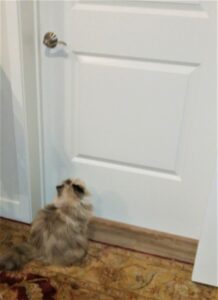 ∙ Since 1992, the Spay and Neuter Animal Network, otherwise known as SPAN, has made it their mission to reduce dog and cat overpopulation throughout Ventura County by raising public awareness about the direct consequence of irresponsible breeding.
∙ Since 1992, the Spay and Neuter Animal Network, otherwise known as SPAN, has made it their mission to reduce dog and cat overpopulation throughout Ventura County by raising public awareness about the direct consequence of irresponsible breeding.
Today more than ever, responsible dog and cat owners like you play the most significant role in the solution to overpopulation by spaying and neutering your pets. SPAN shares in that responsibility by providing financial assistance to pet owners who would otherwise be unable to pay for this procedure.
SPAN is a highly regarded nonprofit and recognized for commitment to their mission and overall success. Over the last 30 years, SPAN has provided financial assistance for the spay and neuter of over 35,000 thousand dogs and cats.
“SPAN receives hundreds of requests for financial assistance every year. Our ability to help pet owners is directly related to our Thrift Store sales, Legacy gifts, and unrestricted cash donations. Thanks to our all-volunteer staff at SPAN, we are proud to say that 100% of our income is used towards spay and neuter procedures.” — SPAN Board of Directors
For more about SPAN, their mission, and opportunities to assist, please visit at www.spanonline.org.
Shop the SPAN Thrift Store, located at 110 N. Olive St. Suite A Ventura (Please visit website for store hours). SPAN Thrift Store Phone: 805-641-1170
∙ Veterinary Viewpoint: Raising healthy puppies
Dr. Joanna Bronson
Lack of sleep is normal for new puppy owners. Puppies play hard, eat, and sleep. Potty training should rotate around any change in activity. Puppies will have to relieve themselves after playing, eating, and sleeping, and any other form of excitement, usually every hour for puppies a month old or younger.
Thankfully, the potty-training process usually goes smoothly when consistency is followed. There may still be occasional accidents, and during inclement weather, an indoor potty-training pad may come in handy. The important thing is not to punish the pup when an accident happens. He’s doing what nature tells him to do. Praising him when he does go outside is a good thing.
If an accident is discovered, and he is close by, pick him up, take him outside and walk a bit. Do not rub his nose in it his accident.
Any new puppy should be closely chaperoned inside and outside. New puppies want to chew anything in sight. Rocks, twigs, leaves, etc., all taste and crunch satisfactorily. Watch and remove any objects before they get lodged or swallowed.
Until your puppy is fully vaccinated, it’s best to avoid dog parks and contact with other dogs. If your puppy is small enough to carry, you may expose him to watching other animals, while keeping him safe from touch.
Puppies like to bite, you and everything in sight. Their teeth are horribly sharp. Exchange your flesh for a toy and trying to keep him occupied with appropriate chew toys, but make sure that toys cannot be easily dismantled and parts swallowed or get stuck in his mouth.
Also, be aware of poisonous substances and plants. Keep the garbage and all human food out of reach. Medications should always be kept out-of-sight. Electrical cords are very tempting to chewers and can be deadly through electrocution.
∙ Dr. Joanna Bronson of Bronson Veterinary Services,
Whether you’re a new dog owner or a seasoned pup parent, there’s always something new to learn about taking care of your pet.
Keep your dog on heartworm medication
Add extra water bowls around the house to prevent dehydration in older dogs
It’s best to make your older dog’s trip to the water bowl as short and easy as possible.
Making sure your older dog has constant access to water can help prevent dangerous dehydration.
If your dog has difficulty climbing stairs, it’s a good idea to keep their food and water bowls on the ground floor of the house.
Give your dog personal space if they need it. All dogs are different — some pets love to snuggle up, but others don’t like to be closely cuddled or held.
Long play sessions, active games, praise, and treats are all ways to show your dog that you love them without invading their personal space.
If you’re struggling to train your dog, miscommunication may be the problem.
Giving dogs inconsistent verbal cues can be confusing for them. For example, telling your dog to “go potty” one day and “go pee” the next can be confusing.
Instead, train your dog using the exact same word or phrase every time and try to keep those cues short, like saying “down” rather than “go lay down.”
Try to keep your dog’s diet consistent
Suddenly changing your dog’s food could upset their stomach or give them diarrhea.
Brush your dog’s teeth every day
Just like those of humans, dog’s teeth should be regularly brushed to avoid cavities and bad breath.
If you aren’t able to brush your dog’s teeth, talk to your vet about products that your dog can chew on to control tartar buildup.
Make and keep regular vet visits
Dogs can sometimes develop health problems that aren’t obvious to the untrained eye, so it’s important to schedule routine visits to the vet.
Regular checkups are also opportunities to monitor your dog’s dental health and keep them up-to-date on vaccinations, which can help you avoid costly interventions in the future.
Resist the urge to bend the rules, even on special occasions. For example, allowing your dog on the furniture as a treat but then scolding them for jumping on the sofa the next day can be very confusing, so try to establish clear house rules and stick to them.
Praise your dog for good behavior instead of scolding them when they’re naughty
Instead of scolding your dog for being afraid or nervous, try showering them with praise when they calm down or giving them a treat when they appropriately react to a stressful situation.
Just as humans may develop neurodegenerative conditions such as Alzheimer’s disease as they grow older, our aging canine friends also can develop dementia, also referred to as canine cognitive dysfunction syndrome (CCDS), a complex of behavioral and neurological symptoms the prevalence of which increases with age.

